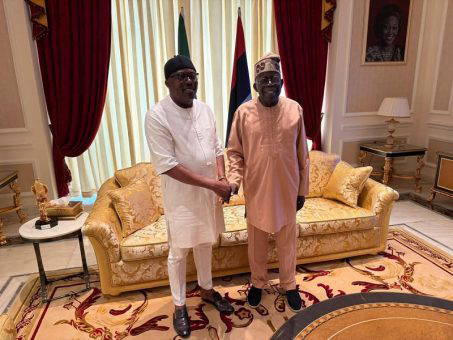News
How Do We Save Nigeria from Completely Falling Apart?

By Joel Popoola
The 2023 election may feel like a long way off, but the battle to succeed President Buhari is already underway.
But who would want to step into his shoes?
Just this week the influential international news agency Bloomberg asked the question “is Nigeria falling apart?”
It’s hard to argue that it isn’t.
The real question is “how are we going to fix it?”
How are we going to fix an economy where unemployment is 33% and inflation is running at 18%?
What are we going to do to improve the lives of the 80,000,000 Nigerians who live on the equivalent of less than $2 a day – a figure the World Bank predicts may rise to 100,000,000 following COVID-19?
How is a nation economically dependent on oil going to face up to a post-oil future?
What is to be done to repair an education system where more children are out of school than any other country on Earth?
And critically, how are we to unite a nation which has in recent months seen youth clashing with police, jihadist attacks in the north east, herder attacking famers in the central belt, piracy in the Gulf of Guinea, separatism in the south east and kidnappings and corruption pretty much everywhere?
People complain that President Buhari has no answers to any of these issues – but does anyone?
Perhaps Nigeria can be healed with a combination of the technology of the future and a traditional south-eastern practice of the past – the Igbo Apprenticeship System.
The Igbo Apprenticeship system has been described as an example of “stakeholder capitalism”– an economic system in which the aim of businesses is not just to make money, but to elevate their communities and where successful businesses aim to support the growth of other businesses in the local area and supply chain, rather than crushing the competition.
Stakeholder capitalism is underpinned by the idea that instead of accepting a society where a handful of businesses or individuals are super-powerful, we aim for a society where everyone is dependent upon each other, where everyone has an incentive to co-operate, where everyone is involved and where everyone has a say.
The idea that we will all achieve more if we work together is so basic we all teach it to our children practically from birth. So why has the concept become so alien in our economy!
Inclusive growth leads to shared prosperity by encouraging co-operation aimed at economic growth – and everyone benefits!
More importantly, the benefits to stakeholder capitalism aren’t measured in money. While Nigeria has average literacy rate of 62%, states where it is commonplace regularly record literacy rates in excess of 90% Nigeria needs a stakeholder society – a society where everyone has a say.
People need to know that their voices will be heard. Leaders need to listen. But in a complicated, diverse and dispersed modern world both sides need technology to make that engagement possible.
At the digital democracy campaign I lead, we’re trying to develop the digital platforms necessary to deliver a stakeholder society.
We have created a free smartphone app called Rate Your Leader which puts people in direct contact with their elected leaders – making sure their voices are heard by the people who take the decisions which affect their lives.
To make sure that the conversation is courteous and constructive, Rate Your Leader’s abuse-proof technology also makes insulting or offensive messages impossible.
Rate Your Leader also allows other registered local voters to contribute to these discussions – letting local leaders know what matters most to the people who elect them and accurately assess how widespread these views are. And voters can even rate their elected officials on transparency and accessibility – helping their peers to see what candidates are worth voting for.
The app empowers electors and elected to come together to address matters of community concern and to collaborate to make local areas better, as well as immediately highlighting issues in need of addressing to the people with the power to address them.
This sort of engagement, which can be carried out from the comfort of the home at the touch of a button, could be the first step towards a truly stakeholder society.
The problems faced by our nation can feel insurmountable. But they are not, as long as we aim work together and utilise the technology of the digital age to bring us together.
Joel Popoola is a Nigerian tech entrepreneur and digital democracy campaigner. He is the creator of the Rate Your Leader app. Follow Joel on Twitter @JoPopoola
News
Finally, Police Suspend Tinted Glass Permit Enforcement

The Nigeria Police Force has suspended the nationwide enforcement of its tinted glass permit policy following an interim court order that restrained the move.
The Force announced on December 15, 2025, that it would begin enforcing the policy starting January 2, 2026, citing its responsibility to ensure public safety and internal security.
However, in a statement issued on Thursday and signed by Force Public Relations Officer Benjamin Hundeyin, the police revealed that they were served with an interim order on December 17, 2025.
The enforcement will remain suspended pending the hearing and determination of the substantive suit or the vacation of the interim order.
“The Nigeria Police Force was served with an interim order of court in Suit No. HOR/FHR/M/31/2025, issued on 17th December 2025, restraining the Force from proceeding with the enforcement of the Tinted Glass Permit policy pending the hearing and determination of the substantive suit or the vacation of the order,” the statement said.
The police also confirmed that they had entered an appearance in the case, raised preliminary objections, and formally requested the vacation of the interim order.
The case has been adjourned to January 20, 2026, for further hearing.
“In line with constitutional obligations and respect for judicial authority, the Nigeria Police Force has entered appearance in the matter, raised preliminary objections, and formally applied for the vacation of the interim order. The court has adjourned the case to 20th January 2026 for further proceedings,” the statement added.
The statement noted that the suspension of enforcement is being carried out in strict adherence to the ongoing court order.
“Accordingly, and strictly in compliance with the subsisting court order, the Nigeria Police Force has placed the enforcement of the Tinted Glass Permit policy on hold nationwide, pending the decision of the court.”
Inspector-General of Police Kayode Egbetokun reaffirmed the Force’s commitment to upholding the rule of law while fulfilling its duty to protect lives and property.
“The Inspector-General of Police, IGP Kayode Adeolu Egbetokun, PhD, NPM, affirms that the Nigeria Police Force remains resolute in upholding the rule of law while discharging its primary mandate of protecting lives and property. The Force will continue to deploy lawful, intelligence-driven strategies to address security challenges and safeguard public safety across the country,” the statement added.
The Force also assured members of the public that it would communicate further developments and issue clear guidance as appropriate, following the court’s determination of the matter, in the overriding interest of public order and national security.
News
Court Remands Ex-AGF Malami, Son, Wife in Kuje Prison

The Federal High Court In Abuja on Tuesday ordered the remand of the Former Attorney-General of the Federation and Minister of Justice, Abubakar Malami (SAN), at the Kuje Correctional Centre pending the hearing and determination of their bail application.
The trial judge, Justice Emeka Nwite, also ordered the remand of his co-dedendants, his son, Abubakar Malami, and one of his wives Bashir Asabe.
Justice Nwite made the order after taking arguments from the defence team led by Joseph Daudu (SAN) and the prosecution counsel Ekele Iheneacho (SAN).
Malami and his co-defendants are facing a 16-count money laundering charge preferred against them by the Economic and Financial Crimes Commission.
The EFCC alleges that the defendants conspired at various times to conceal, retain and disguise the proceeds of unlawful activities running into several billions of naira.
According to the charge, the alleged offences span several years and include the use of companies and bank accounts to launder funds, the retention of cash as collateral for loans, and the acquisition of high-value properties in Abuja, Kano and other locations.
The commission further alleges that some of the offences were committed while Malami was serving as Attorney-General of the Federation, in breach of the Money Laundering (Prohibition) Act 2011, as amended, and the Money Laundering (Prevention and Prohibition) Act 2022.
News
2027: Backing Tinubu Not Guarantee for Second Term Ticket, Wike Mocks Fubara

Minister of the Federal Capital Territory (FCT), Nyesom Wike, has sent a veiled message to Rivers State governor, Siminalayi Fubara, saying support for President Bola Tinubu alone will not guarantee any election ticket.
Wike made the statement on Sunday during a public outing in Emohua Local Government Area of Rivers State.
His remarks were widely seen as directed at Governor Fubara, amid lingering political crisis in the State.
The former Governor of Rivers State said political loyalty must be tested during difficult times, not after power has been secured.
He mocked those he described as late supporters of President Tinubu, insisting that sudden alignment would not earn political rewards.
He said: “So the issue is not whether you are supporting Tinubu. That one, we have taken too long, long… Yes, oh. So Tinubu’s issue is not an issue again. Yes. Do you understand me? Yes. Tinubu’s issue is that nobody should be coming here to tell a day. We are for Tinubu; I am against you. Who is for Tinubu University? (laughs) That cannot give you any ticket oh! (laughs again) Direct, direct. It will not. Direction. Direction.”
Wike stressed that his political camp stood with Tinubu when the decision was unpopular. He said that support given under pressure carries more weight than alignment after victory.
He also recalled how the Rivers State House of Assembly openly backed Tinubu early, long before the election outcome was certain.
According to him, some of those now making public declarations were absent during the critical period.
“The same people now who came to declare, put them to God… But they should declare they are saying it for a candidate. Yes. Don’t you see characters? (laughs) So I send the sword far ahead of them.”
Wike further spoke on governance and continuity. He defended projects and agreements initiated during his tenure as governor. He said it is often difficult for successors to acknowledge past efforts, even though government is a continuous process.
His comments come weeks after Governor Fubara formally aligned with the All Progressives Congress (APC), the party of President Tinubu.
The move followed months of political crisis in Rivers State, which led to federal intervention and a declaration of emergency rule.
Political watchers believe Wike’s remarks constitute a direct response to Fubara’s recent positioning as a key Tinubu ally in Rivers politics. Critics argue that Fubara’s support surfaced only after the political storm had settled.
Wike, who remains a dominant force in Rivers State politics despite serving in Abuja, appears to have drawn a clear line ahead of the 2027 elections.
He suggested that political tickets would be decided by proven loyalty, not convenience.
Videos from the event in Rumuche, Emohua, spread rapidly on social media. Many users described the speech as a coded warning to the governor.
As of press time, neither the Rivers State Government nor Wike’s media team had issued an official clarification.
The comments, however, suggest that the political rift between both camps is still active, despite earlier peace moves brokered at the national level.






